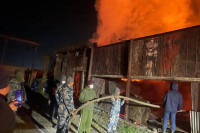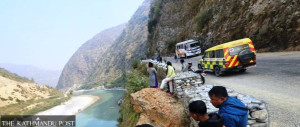Bagmati Province
Uterine prolapse is common in rural Chitwan, but only a few seek treatment
Many women in rural belts do not take the symptoms of uterus prolapse seriously, say health workers.Pramita Dhakal
Bishnumati Sunar, 57, of Madi Municipality Ward No. 7 has been suffering from a bone-related disease that makes movement difficult for her, especially when she has to bend over. It’s been more than a couple of years since she’s been riddled with pain in her body and a weak hip, she says. But she does not know what the disease is and neither has she sought treatment. She binds her hip with a belt which eases her pain to a certain extent.
“The pain didn’t really feel like a big deal to me,” she said.
Sunar, a mother of three, learned only on Wednesday, at a free health camp in Diwanagar, that her uterus had prolapsed. She, however, had gone to the camp to check her eyes, not her uterus. When the camp volunteers suggested she get her uterus checked, she declined, saying she has no problem. “I don’t have a problem,” she told them. “Why do I have to show my private parts?”
Sunar agreed to go through the check-up only after the volunteers told her that all the health officers at the camp were women and that they would accompany her. When Ayodha Kumari Pathak, a senior nurse at BP Koirala Memorial Cancer Hospital, ran tests on Sunar, she found that Sunar’s uterus had prolapsed.
“Many women in rural belts do not take the symptoms of uterus prolapse seriously,” Pathak told the Post. “They resort to tying belts around their hips for temporary relief, which may cause further damage if done wrong.”
Of the over five dozen women that Pathak and her team examined at the camp, eighteen were diagnosed with uterus prolapse. According to Pathak, only a few of them were actively seeking treatment, while many were hesitant. “There’s still a widespread stigma attached to one’s genitals, especially in the rural parts of the district,” Pathak said.
Gita Subedi, 39, who was at the camp for a check-up, said, “My hands and legs feel dead, so my problem has got nothing to do with my uterus. I don’t need a check-up of private parts.” Upon inspection, it was found that Geeta too was suffering from uterine prolapse.
Pathak added that 28 percent of women who were examined at the camp were found to have uterine prolapse of first, second, and third degrees, while one was diagnosed with uterine cancer.
“We have advised them to do some exercises as a treatment, but they should change their lifestyle in the first place,” Pathak said, adding that many women she examined were negligent about their health.
According to Pathak, women suffering from weak hips and pain in the waist shouldn’t carry a load of over five kgs on either hand and should be careful while tying a belt around their waist.
Tika Kumari Khatri, a local school teacher, said that camps like these are infrequent in Diwanagar, Madi, which is perhaps why so many women were diagnosed with uterine prolapse.
“Given the stigma around one’s genitals, only a few women go to hospitals for treatment. Health camps like these are important for these women to get their health examined,” Khatri said.
Diwanagar is a settlement of predominantly Dalits, indigenous and marginalised communities. The reasons behind uterine prolapse among women are early pregnancy, mainly due to a lack of contraceptives, and heavy workload, Pathak said.




 12.12°C Kathmandu
12.12°C Kathmandu













